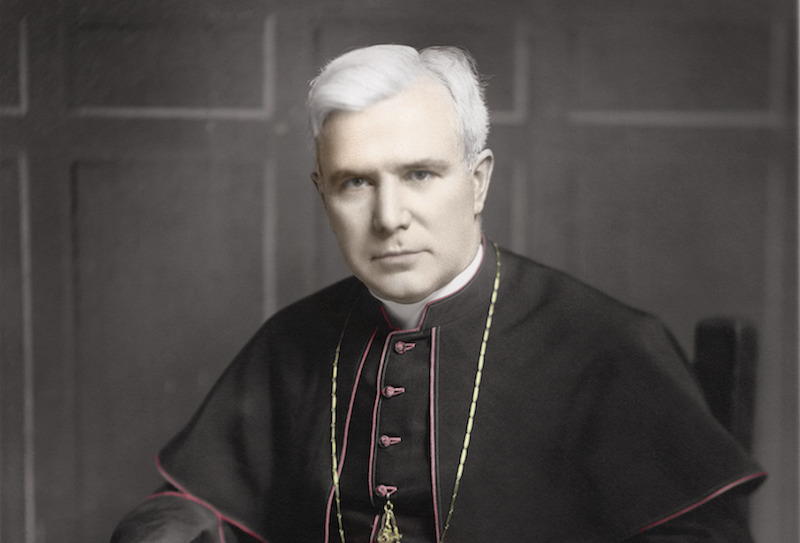BISHOP ANDREW J. BRENNAN
A CHRISTMAS GREETING AND PROPHECY
When Andrew J. Brennan (1877–1956) published a Christmas message in 1927, he was marking the end of his first year as bishop of Richmond. Brennan had come to the diocese from Scranton, Pennsylvania, where he was a priest (1904) and then auxiliary bishop (1923).
In retrospect, Brennan’s Christmas message seems to have foreshadowed the accomplishments and challenges of the Diocese of Richmond during the next decade. He wrote that the peace joyfully announced by angels at Christ’s birth “can be enjoyed in the midst of poverty, in the midst of external strife, and even in the midst of pain and suffering.”
Brennan’s tenure as the eighth bishop of Richmond (1926–1945) included growth and development in the diocese but also the challenges of anti-Catholicism, the Great Depression and personal adversity.
Several parishes received resident pastors during this period. To better manage the diocese, Brennan made several administrative changes, including the establishment of deaneries – regional groupings of parishes overseen by a senior priest called a dean).
Furthermore, in response to a growing number of Catholic students, campus ministries were begun at the College of William & Mary, the University of Virginia and Virginia Tech (ca. 1923–1939). (At that time, Virginia Tech was located in the neighboring Diocese of Wheeling, but Richmond priests ministered there because most students had their permanent places of residence in the Diocese of Richmond.)
In another sign of growth and maturity in the diocese, Bishop Brennan presided over the 25th anniversary of the dedication of the Cathedral of the Sacred Heart in Richmond (1931) and the dedication of two charitable institutions made possible by generous benefactors. These were St. Joseph’s Villa in Richmond (1931), for white girls, which replaced St. Joseph’s Orphan Asylum and Free School (1834) and which continued to be run by the Daughters of Charity, and the Barry-Robinson School for Boys in Norfolk (1934), which was under the care of the Benedictines.
Following a wave of anti-Catholicism in 1928 associated with the candidacy of Democratic Gov. Alfred E. Smith of New York, the first Catholic to be nominated for president, Bishop Brennan decided that the diocese should have its own newspaper to provide a Catholic perspective. He purchased The Virginia Knight, founded in 1925 as the monthly publication of the Knights of Columbus, and renamed it The Catholic Virginian in 1931.
Even with the Great Depression underway (1929– 1939), but before it reached Virginia, several schools and churches were built. But the arrival of the economic catastrophe in 1932 halted such projects and inflicted widespread hardship.
President Franklin D. Roosevelt launched several initiatives to ameliorate the effects of the Great Depression, including the Civilian Conservation Corps (CCC), which employed young men in the construction of public works (1932–1942). Priests in the diocese ministered to the approximately 1,400 Catholics working at the 61 CCC camps in Virginia.
In 1934, Brennan suffered a stroke. He was unable to carry out his duties or even speak, but he officially remained bishop of Richmond until 1945. In the meantime, Peter L. Ireton of Baltimore was appointed administrator of the diocese and coadjutor bishop, meaning he would automatically succeed Brennan upon his formal resignation.
Brennan resigned in 1945 and was made an assistant to the pontifical throne — an honorific position in the papal court. Following his death in 1956, he was entombed in the chapel of St. Joseph’s Villa.
Nearly 30 years earlier, The Virginia Knight had published Bishop Brennan’s Christmas message in its December 1927 issue. Perhaps Brennan found solace in recalling this message amid his own suffering.
Christmas Message from Right Reverend Andrew J. Brennan, D.D., Bishop of Richmond
The angelic message, sung from the hillsides of Judea, strikes the keynote of the Christmas spirit: “Peace to men of good will” [Lk 2:14]. It is a season of joy and happiness, but a joy and happiness tempered by a celestial peace, and this peace is not simply a cessation of strife — a negative peace — but a God-given gift which seems to be a breath from heaven itself.
As peace was the first message of the incarnate God to man, so also was it his last message. “Peace I leave with you. My peace I give unto you” [Jn 14:27], was His final message to His apostles at the last supper. But the peace of which our Lord spoke is an interior peace, a peace of soul. It is a peace which can be enjoyed in the midst of poverty, in the midst of external strife, and even in the midst of pain and suffering, because it is a peace which comes from a union of the soul with God. It is God-given and cannot be disturbed by worldly strife. Without it there is no genuine worldly happiness.
The Christmas message which the Church proclaims to the world today is the same message which was proclaimed by the angels from the hillsides of Judea on that first Christmas morn, and this message we are pleased to convey to the readers of The Virginia Knight. May your Christmas be a holy and happy one, and the Infant King, from His manger throne flood your souls with that celestial peace which is, and can only be given, to men of good will.

